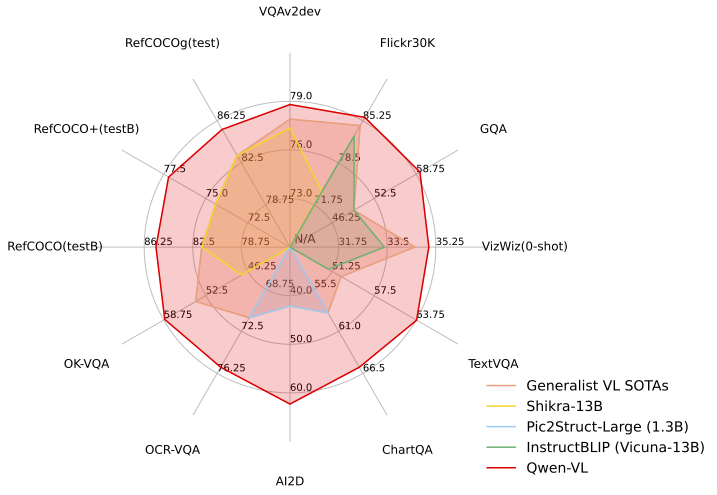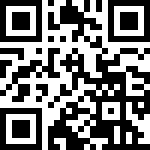Qwen-VL

Qwen-VL 是阿里云研发的大规模视觉语言模型(Large Vision Language Model, LVLM)。Qwen-VL 可以以图像、文本、检测框作为输入,并以文本和检测框作为输出。Qwen-VL 系列模型性能强大,具备多语言对话、多图交错对话等能力,并支持中文开放域定位和细粒度图像识别与理解。
目前,我们提供了Qwen-VL和Qwen-VL-Chat两个模型,分别为预训练模型和Chat模型。如果想了解更多关于模型的信息,请点击链接查看我们的技术备忘录。本仓库为Qwen-VL-Chat仓库。
Hugging Face:https://huggingface.co/Qwen/Qwen-7B
GitHub:https://github.com/QwenLM/Qwen
要求(Requirements)
- python 3.8及以上版本
- pytorch 1.12及以上版本,推荐2.0及以上版本
- 建议使用CUDA 11.4及以上(GPU用户、flash-attention用户等需考虑此选项)
依赖项 (Dependency)
快速使用(Quickstart)
我们提供简单的示例来说明如何利用 🤗 Transformers 快速使用 Qwen-VL。
在开始前,请确保你已经配置好环境并安装好相关的代码包。最重要的是,确保你满足上述要求,然后安装相关的依赖库。
pip install -r requirements.txt接下来你可以开始使用Transformers来使用我们的模型。关于视觉模块的更多用法,请参考教程。
from transformers import AutoModelForCausalLM, AutoTokenizer
from transformers.generation import GenerationConfig
import torch
torch.manual_seed(1234)
tokenizer = AutoTokenizer.from_pretrained("Qwen/Qwen-VL", trust_remote_code=True)
# use bf16
# model = AutoModelForCausalLM.from_pretrained("Qwen/Qwen-VL", device_map="auto", trust_remote_code=True, bf16=True).eval()
# use fp16
# model = AutoModelForCausalLM.from_pretrained("Qwen/Qwen-VL", device_map="auto", trust_remote_code=True, fp16=True).eval()
# use cpu only
# model = AutoModelForCausalLM.from_pretrained("Qwen/Qwen-VL", device_map="cpu", trust_remote_code=True).eval()
# use cuda device
model = AutoModelForCausalLM.from_pretrained("Qwen/Qwen-VL", device_map="cuda", trust_remote_code=True).eval()
# Specify hyperparameters for generation (No need to do this if you are using transformers>=4.32.0)
# model.generation_config = GenerationConfig.from_pretrained("Qwen/Qwen-VL", trust_remote_code=True)
query = tokenizer.from_list_format([
{'image': 'https://qianwen-res.oss-cn-beijing.aliyuncs.com/Qwen-VL/assets/demo.jpeg'},
{'text': 'Generate the caption in English with grounding:'},
])
inputs = tokenizer(query, return_tensors='pt')
inputs = inputs.to(model.device)
pred = model.generate(**inputs)
response = tokenizer.decode(pred.cpu()[0], skip_special_tokens=False)
print(response)
# <img>https://qianwen-res.oss-cn-beijing.aliyuncs.com/Qwen-VL/assets/demo.jpeg</img>Generate the caption in English with grounding:<ref> Woman</ref><box>(451,379),(731,806)</box> and<ref> her dog</ref><box>(219,424),(576,896)</box> playing on the beach<|endoftext|>
image = tokenizer.draw_bbox_on_latest_picture(response)
if image:
image.save('2.jpg')
else:
print("no box")
评测
我们从两个角度评测了两个模型的能力:
- 在英文标准 Benchmark 上评测模型的基础任务能力。目前评测了四大类多模态任务:
- Zero-shot Caption: 评测模型在未见过数据集上的零样本图片描述能力;
- General VQA: 评测模型的通用问答能力,例如判断题、颜色、个数、类目等问答能力;
- Text-based VQA:评测模型对于图片中文字相关的识别/问答能力,例如文档问答、图表问答、文字问答等;
- Referring Expression Compression:评测模型给定物体描述画检测框的能力;
- 试金石 (TouchStone):为了评测模型整体的图文对话能力和人类对齐水平。我们为此构建了一个基于 GPT4 打分来评测 LVLM 模型的 Benchmark:TouchStone。在 TouchStone-v0.1 中:
- 评测基准总计涵盖 300+张图片、800+道题目、27个类别。包括基础属性问答、人物地标问答、影视作品问答、视觉推理、反事实推理、诗歌创作、故事写作,商品比较、图片解题等尽可能广泛的类别。
- 为了弥补目前 GPT4 无法直接读取图片的缺陷,我们给所有的带评测图片提供了人工标注的充分详细描述,并且将图片的详细描述、问题和模型的输出结果一起交给 GPT4 打分。
- 评测同时包含英文版本和中文版本。

作者:Ddd4j 创建时间:2023-12-26 21:38
最后编辑:Ddd4j 更新时间:2026-02-27 09:37
最后编辑:Ddd4j 更新时间:2026-02-27 09:37
